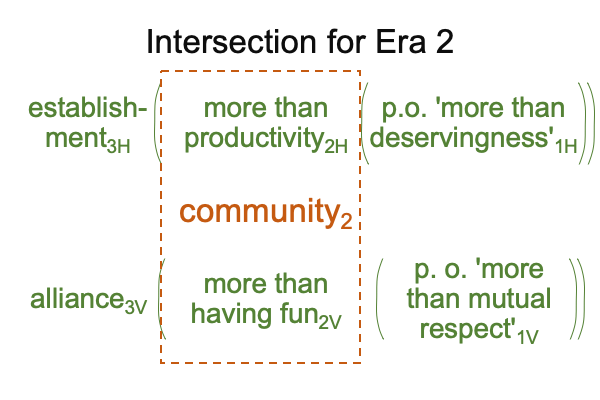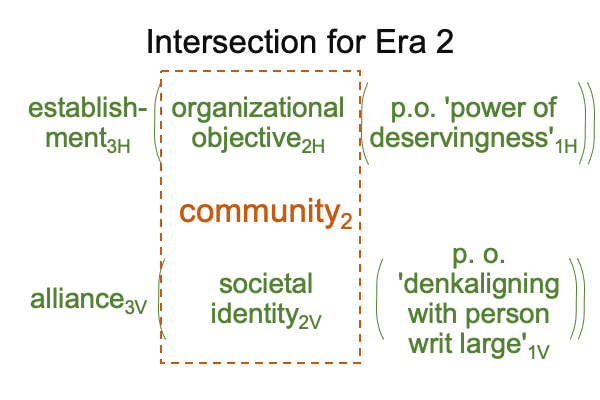0525 InstitutionsC become persons writ large. Individuals in communityA become institutions writ small.
Clearly, my discussion of third-person morality runs on a parallel track to Tomasello’s discussion of objective morality in chapter four. They run through the same anthropological territory, but they stop at different stations.
At this junction, I am tantalizingly close to articulating the intersection for Era 2.
Here is the general version.

0526 The community has a slogan. What that slogan is, I do not know.
0527 What do I know?
The community latches all the productive2H and fun-loving2V teams behind the locomotive of one big slogan.
Also, the community spawns its own teams. These teams are more than productive2H and more than fun-loving2V. Teamsare interpellated into being by institutions within the community.
In the Lebenswelt that we evolved in, the community (150) harmonizes all other social circles: family (5), intimates (5), teams (15), bands (50), mega-bands (500) and tribe (1500).
0528 What is a good substitute for more than productivity2H?
Does an interpellating organizational objective2H fit the slot?
0529 What potentiates an organizational objective2H?
Perhaps, the power of deservingness1H will do. An organizational objective2H emerges from the power of deservingness1H that comes from serving the “me” of a person writ large. An organizational objective2H situates the potential of the power of deservingness1H with a recognition2H that an individual deserves power2H within the institution3H.
So, the power of deservingness1H is situated as deserving of power1H.
Is that confusing enough?
I love explicit abstractions.
0530 What is a good substitute for more than having fun2V?
Well, congregations are about more than having fun.
Tomasello discusses these types of issues in the subsection titled, “Culture and Loyalty”.
An institutionC calls the individualA to align his or her individual perceptionsA with the perceptions of a person writ largeC.
0531 Surely, interpellation brings a common cultural groundC into relation with individual cultural practicesA (or “conventions”).
Interpellation keys into Tomasello’s explicit terminology, including “identification”, “loyalty”, “legitimization” and “moralization”.
0531 Interpellation offers a societal identity2V to the personA who aligns his or her judgments, perceptions and feelings to the person writ largeC. The Germans have a word for this. The word is “denkalign”. “Denk” means “thought”. If a person may be characterized as a perceptive soul [animates] a reactive body, then denkalignment offers a way for the perceptive soul to train its body’s emotions.
0533 Oh, now I can start to appreciate what Tomasello means by the term, “objective morality”.
Through denkalignment, I train my emotions according to a worldview that exists independently of what anyone thinks of it.
0534 Here is a picture of the substitutions.

